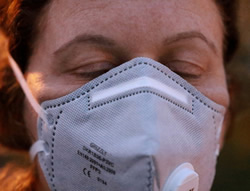Kathy Morris* says while everyone is suffering the impacts of COVID-19, women may experience more than their share of financial and social strain.
 It is undeniable that everyone will be impacted by the coronavirus and many are hurting financially already.
It is undeniable that everyone will be impacted by the coronavirus and many are hurting financially already.
However, women may experience more than their share of financial and social strain.
Women already earn less than men at every level of education.
In addition to earning less, women take on a greater burden of unpaid labour than men.
Research finds that women daily do an hour and a half more housework and childcare.
With schools closed, how is that unequal distribution of labour being handled?
We surveyed 100 women to highlight the impact of the coronavirus on women.
Summary of findings
- 35 per cent of women would face dire circumstances within two weeks of missing a paycheque; 13 per cent can’t afford to miss a single paycheque.
- Half of women surveyed are currently working from home. The other half is evenly split between essential and non-essential workers.
- 14 per cent more women say they are doing the brunt of childcare than are splitting it evenly with a partner.
- 42 per cent of mothers surveyed say school closures are making them less effective workers.
We breakdown our data further and provide firsthand accounts of how the coronavirus is being experienced by women.
Slightly over half of the women surveyed are able to work from home.
The other half are evenly split between essential and non-essential workers.
What types of essential and non-essential jobs are dominated by women?
While healthcare positions on the “front lines” of the coronavirus may have more job security, they come with the risk of interacting with a sick population daily.
One survey participant explained her thoughts on the situation: “It makes me nervous since I am on immune suppression for rheumatoid arthritis.”
“But as a pharmacist, I don’t get to stay home.”
On the other end, women also dominate many positions deemed non-essential.
Women working these jobs may be laid off or out of work for a long period, unexpectedly.
How equipped can women go without a paycheque?
While 46 per cent women said they could do two months or longer without a paycheque, the remaining 54 per cent can only make it one month or less.
More crucially, 13 per cent of women cannot afford to miss even one paycheque without dire consequences.
Many already have missed a paycheque.
While many women are handling unexpected unemployment, many working mothers are struggling to handle work and find new childcare arrangements due to school closures.
Some 14 per cent more women say they are doing the brunt of childcare than those who report splitting it evenly with a partner.
Perhaps more concerning, 42 per cent of women report they are now less effective at their jobs and the situation is hurting their work performance.
“I basically can’t work,” one woman said.
“I work freelance, and while my husband has to work from his home office, I keep the kids away from him, but by the time he is done, I am too tired to concentrate on creative work.”
Schools need to be cancelled. However, it seems the brunt of the labour is falling on women.
Summary on the impact of the coronavirus on working women
Everyone is, or will soon, experience the impacts of the coronavirus in their communities.
There is plenty of hurt to go around, and no-one is saying that men will not experience hardships.
However, women will experience different hardships, built on their current position in society.
The jobs women do, the statistically smaller paycheques, and women shouldering the brunt of childcare and household chores will shape women’s experience of the coronavirus.
While many women shared their stories of anxiety and uncertainty surrounding the pandemic, others shared their hopes and innovative solutions to tackling new challenges.
Many women understandably reported anxiety and concern over their families’ health.
Particularly anxious are those in sensitive medical situations such as pregnancy or those separated from loved ones.
However, the most pressing concerns discussed were finances.
“As long as we can keep working, we will be okay,” one woman said.
Another described uncertainty over the job search and dwindling bank accounts, saying simply: “I can’t afford to not work.”
* Kathy Morris is Marketing Manager at Zippia.
This article first appeared at www.zippia.com.











